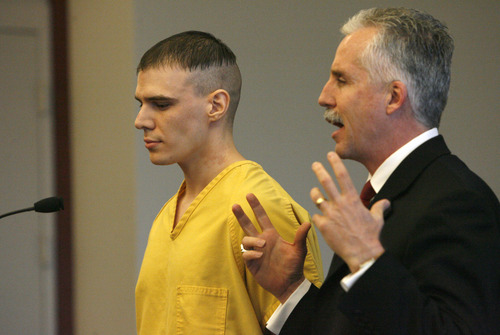This is an archived article that was published on sltrib.com in 2013, and information in the article may be outdated. It is provided only for personal research purposes and may not be reprinted.
A man who attacked his girlfriend's ex-lover with a knife, while his friend used a battle ax, has lost his latest effort to escape an attempted murder conviction.
In a ruling released Thursday, the Utah Court of Appeals affirmed Cody Jesse Augustine's conviction on one count of attempted murder, a first-degree felony. Augustine, 25, was convicted two years ago for repeatedly stabbing 17-year-old Justin Ennis with a knife outside Ennis' Kearns home in 2008.
Augustine's friend, Scott Tyler Stapley, also participated in the attack and reportedly wielded a four-sided battle ax. Augustine used a knife, police reported. Both Stapley and Augustine were sentenced to three years to life in prison.
Police have said Stapley and Augustine were members of the Juggalos, fans of the Insane Clown Posse rap group who are classified as a gang by the FBI and Utah law enforcement.
Augustine's attorneys argued he should get a new trial because he was under extreme emotional distress during the attack. They contend they should have been allowed to call an expert witness to testify at trial about Augustine's emotional state. The trial judge prevented the expert from testifying, and defense attorneys appealed, saying that violated Augustine's constitutional right to call witnesses.
According to the appeals court ruling, Augustine's emotional-distress defense was based on three "triggering events": He reportedly believed he had contracted a sexually transmitted disease from his girlfriend, who he concluded must have been infected by Ennis; he drove to Ennis' home for a fistfight, which "spiked his adrenaline"; and he suffered emotional distress at the sight of blood as he and Stapley attacked Ennis.
Prosecutors have described the incident as being like a "Hollywood slasher flick." Ennis suffered an 8-inch cut to his neck, a 10½-inch cut in his left pectoral muscle and smaller cuts on his shoulder and hands. It required more than 300 stitches to close his 12 wounds, five of which were from being stabbed, and he spent five days in the hospital.
Together, those triggers caused Augustine to "lose control of his rationality," his attorneys argued.
The appeals court rejected that argument, ruling that Augustine was not allowed to make an extreme emotional distress defense. That defense is invalid because the "stressors" causing Augustine's emotional state were "self-created."
The ruling consequently sides with government attorneys who argued that Augustine's emotional distress was the result of engaging in a violent attack. They also pointed out that emotional distress cannot be used as a defense if it is caused by the commission of a crime.
Assistant Utah Attorney General Karen Klucznik said Thursday afternoon that she was "very pleased" with the ruling. During the trial, she said, the judge assumed the emotional distress argument would apply but said Augustine's witness wouldn't have helped the jury.
But the appeals court sidestepped that issue by ruling the argument didn't apply in the first place, Klucznik said.
Augustine's attorney did not immediately return calls seeking comment Thursday afternoon.
Twitter: @jimmycdii





